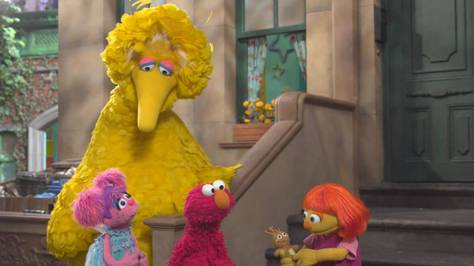
Today is Autism Awareness Day once again, as well as Autism Awareness Month, a time dedicated to the recognition and discussion of this increasingly common neuro-type. In honor of this occasion, I’d like to briefly discuss a topic that, while not entirely new, does somewhat align with what I do here on this blog. That’s because it appears that autism will be visiting the most well known city block on television: Sesame Street.
In 2015, the Sesame Workshop announced a new initiative targeted at discussing autism spectrum disorder. The initiative involved the creation and introduction of a new character to the show, Julia, a 4-year old girl with the disorder who becomes friends with Elmo and Abby Cadabby. She first appeared on external avenues of the show, such as books, animations, and other such educational materials, but the character will soon be making her long-awaited appearance on the Seasame Street show, premiering April 7 on HBO.
Sesame Street is no stranger to covering sensitive topics on their show. Over it’s nearly 50 years on TV, they’ve discussed topics such as divorce, racism, disease, imprisonment, and even death. They’re also not above giving unique traits to their characters in order to bring awareness to such issues. One notable example was in 2002, when they introduced a Muppet named Kami who was born with HIV/AIDS. Though, a common theme among all of Sesame Street’s specialized initiatives is an emphasis on education and acceptance.
According to Sesame Workshop, they’re goal is to normalize the condition and teach kids how to interact with, communicate with, and befriend children with autism. To achieve this, they have worked with multiple experts and researchers in the field in order to properly portray the disorder to the world, avoiding any stigmas or fallacies that may be common on other shows.
This is a huge deal for the autistic community and something I’ve been very interested in for the past couple years. Even though I haven’t seen Sesame Street in God knows how long, I like many others have always had a respect for the show from afar. Outside of it being an American treasure, I believe the show is the highest quality program any kid can watch. It doesn’t dumb down its messages and treats their audience with the respect, care and sophistication needed to teach children effectively. Doing special programs like this is also a fantastic way instill diversity and understanding among kids. Not only teaching the material to the audience, but also making it mainstream.
Though that’s not the only reason I was so fascinated by this move. I was also rooting for this for personal reasons. I haven’t mentioned this online yet, and some of those who know me in real life may not know this yet, but I actually have autism myself. I was diagnosed at age 1 and have been considered high-functioning since I was 3 years old. With the help and support of my parents and siblings, I was able to grow into a comfortable, well-adjusted 20 year old able to use my condition to bolster my life instead of hinder it. I’m currently in college studying computer science and have been blessed with wonderful people in my life that I’m proud to call friends. I feel very lucky.
So, while this news isn’t particularly targeted at me, I whole-heartedly support it so long as it represents autism in a positive way. To me, one of the most important things the show can do is to eliminate the stigma surrounding the disorder. There are a lot of misconceptions about the disorder due to how broad its symptoms can be and sadly a lot of trusted institutions who spread hyperbole about it on a daily basis, leading to them being considered facts. (That’s a story for another day, though). Autism isn’t a disease that needs to be abolished. People with autism aren’t burdens to deal with. Most importantly, no two autistic people are the same, something many people still believe. All Sesame Street has to do that many outlets tend to get wrong is to show autism as something to be embraced and accepted instead of pitied and shunned.
Luckily we seem to be in very good hands, judging by some of the show’s clips featuring Julia online. So far, they’re hitting every single note just right. I love how they’re addressing autism not as a disease or a problem, but as “doing things very differently from other people”. They also took time to explain how autism is different from person to person and highlight the ways Julia is similar to the average person instead of harping on what’s different about her. They gave her some pretty broad symptoms, too, from her hand flapping (a form of stimming) to her less verbal demeanor, which many autistic children will be able to relate to. They even handled the meltdowns correctly. I’m honestly stunned at how well they’re handling this subject.
As long as Sesame Street can continue along that same track and help normalize autism the way they’re aiming for, I’ll point to Julia as the definitive way to teach autism to kids. Autistic children need a good role model to show them that they’re not alone, and I’m hoping Julia will be that role model.
If you’d like to know more about Sesame Street’s autism initiative, click here to see the 60 Minutes segment on the topic. Also, if you’d like to learn more about autism, check out “Ask an Autistic” on YouTube. I highly recommend her videos.
I’m SBox180. Thanks for reading!

Remember when most children’s television talked about real issues? Kudos to Sesame Street for keeping that up despite it not being the norm anymore. This is so important and so exciting!! I’m all for this decision and glad to hear that they have done it justice. It’s like when the American Girl brand (something I had a massive obsession with as a child and still feel a lot of nostalgia for) released dolls with wheelchairs and hearing aids. How cool is it that kids with disabilities of any kind or to any degree can feel like they belong? To be unashamedly who they are without people making fun of them. And that’s what doing these kinds of things accomplishes as well: it teaches people who don’t deal with these specific problems how to treat/view those who do deal with them.
LikeLiked by 1 person
It’s really a wonderful thing. Sometimes we think the world is becoming more and more different everyday, but then things like this really bring the world together. I think it’s important, like you said, to make sure all children can be accepted no matter how they were born. What really appeals to me about Julia (and I’m sure the American Girl dolls, too) is that they’re aiming to normalize these differences instead of focusing on how different they are. If more shows and movies do we’ll be in good hands.
LikeLiked by 1 person
Amen!
LikeLiked by 1 person